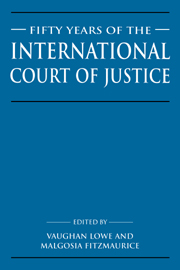Book contents
- Frontmatter
- Contents
- List of contributors
- Preface
- List of abbreviations
- Sir Robert Yewdall Jennings, by Vaughan Lowe
- List of publications of Sir Robert Jennings
- Table of cases
- Part I The International Court of Justice
- Part II The sources and evidences of international law
- 4 The International Court of Justice and the sources of international law
- 5 Municipal law reasoning in international law
- 6 Estoppel and acquiescence
- 7 L'Equité dans la jurisprudence de la Cour Internationale de Justice
- 8 The International Court of Justice and the law of treaties
- 9 International ‘soft law’: a contemporary assessment
- Part III Substance of international law
- Part IV Procedural aspects of the work of the International Court of Justice
- Part V The International Court of Justice and the United Nations
- Index
5 - Municipal law reasoning in international law
Published online by Cambridge University Press: 02 November 2009
- Frontmatter
- Contents
- List of contributors
- Preface
- List of abbreviations
- Sir Robert Yewdall Jennings, by Vaughan Lowe
- List of publications of Sir Robert Jennings
- Table of cases
- Part I The International Court of Justice
- Part II The sources and evidences of international law
- 4 The International Court of Justice and the sources of international law
- 5 Municipal law reasoning in international law
- 6 Estoppel and acquiescence
- 7 L'Equité dans la jurisprudence de la Cour Internationale de Justice
- 8 The International Court of Justice and the law of treaties
- 9 International ‘soft law’: a contemporary assessment
- Part III Substance of international law
- Part IV Procedural aspects of the work of the International Court of Justice
- Part V The International Court of Justice and the United Nations
- Index
Summary
Discussing the well-known municipal law principle directed to the avoidance of absurdity, Blackstone wrote
As to the effects and consequence the rule is, that where words bear either none, or a very absurd signification, if literally understood, we must a little deviate from the received sense of them. Therefore the Bolognan law, mentioned by Puffendorf, which enacted ‘that whosoever drew blood in the streets should be punished with the utmost severity’, was held after long debate not to extend to the surgeon, who opened the vein of a person that fell down in the street with a fit.
Whenever a possible absurdity arises in the course of construing an instrument executed at the more exalted level of inter-state relations, it cannot be wrong to suppose that the relevant rule of treaty interpretation owes something to that municipal law principle. The hapless Bologna surgeon no doubt had some little reason to be grateful to it for stepping in to save him from being ‘punished with the utmost severity’ for an act which, though within the letter of the law, could not seriously be thought to have been within its intent; nor could the result have been the less pleasant for having been reached only ‘after long debate’.
- Type
- Chapter
- Information
- Fifty Years of the International Court of JusticeEssays in Honour of Sir Robert Jennings, pp. 90 - 103Publisher: Cambridge University PressPrint publication year: 1996
- 1
- Cited by



